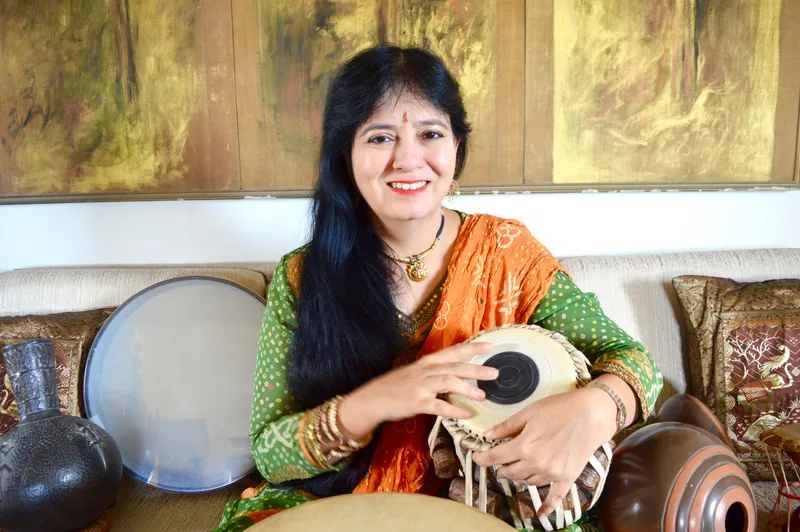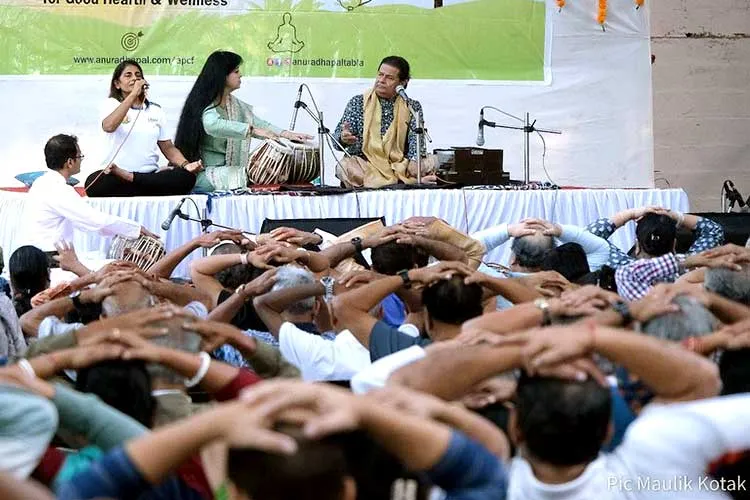Tabla Maestro Anuradha Pal takes on the task of empowering women through art and music
The maestro is acclaimed to be the first professional female tabla player in the world by Encyclopedia Britannica and the Limca Book of Records.
Spaced against the backdrop of the Gateway of India, its courtyard shimmered with diyas (lamps) flowing along serpent-like lines all along the ramp at Dior’s Fall show held in Mumbai. And to match, a mix of Indian classical and contemporary music played alongside a procession of models, which seemed to bring the runway alive.
Along with violins and flutes, Anuradha Pal stood out with her tabla—creating a symphony for spectators to behold. Her beats transcended the Dior Fall show, finding favour among over 13 million viewers on social media, a list that also includes the likes of Bollywood and Hollywood stars like Rekha, Anushka Sharma, Cara Delevigne and Karlie Kloss.
“The process of composing and arranging our Indian Classical and folk music, with Oliver Coates, a wonderful cellist from the UK, and conducting strings by Symphony Orchestra of India and my Indian musician team coupled with fashion was a first and a very thrilling experience,” Pal told HerStory.
Today, Pal is a force to be reckoned with having clinched the title of maestro.
Tryst with music

Anuradha Pal
Pal recounts her relationship with music beginning early on in her life. She recalls memories where she heard her mother, Ila Pal sing ghazals and her father taking her classical music concerts.
Having paid witness to many artists and musicians who would regularly visit her house to meet her grandmother, Sarojben Vyas, it was these acquaintances who suggested she pick up tabla.
And while Pal might be a maestro today, in her first-ever lesson, the instructor refused to teach her.
“He believed that playing the tabla was impossible for girls as it requires lots of strength and persistence,” she said.
Undeterred by the comment, she decided to take to the instrument by herself. That same instructor eventually took her in as a student when she heard her play tabla at all of six years old.
She would go on to perform, aged 9, on Doordarshan and All India Radio, eventually accompanying vocalists and instrumentalists when she was just 13 or 14 years old.
By this measure, Pal recalls not having a very ordinary childhood. "Typically, my day would comprise 6 hours of school, 2 hours of homework, 2 hours of music training, and 5 hours of riyaaz. Instead of chilling with friends, I would go every day, straight from school and college, to practise with different vocalists, instrumentalists and dancers,” she said.
“I was fortunate to get a fantastic exposure to Indian culture, heritage, traditional values, patriotism etc, thus making strong ethics and hard work as driving principles, since my childhood,” she says.
Finding the right tools to success

At the age of 11 Pal’s Gurus, the legendary Tabla players–Ustad Alla Rakha and Ustad Zakir Hussain, offered their guidance which she says was “instrumental in shaping my journey as a musician.”
Not coming from a musician family and being a girl in a male-dominated field, she had to face discrimination and nepotism at every step.
“I had no godfather and no mentor to help me navigate the complex music industry. I was against a stone wall,” she said,
“Strength and growth come only, through continuous effort and struggle,” she adds.
While Pal acknowledges that gender biases and discrimination exist in the industry, she has never let that be an excuse or a hindrance in achieving her goals. “On the contrary, this drives me to work harder, to remain humble and committed, to achieving my desired outcomes with professionalism and honesty,” she said.
She overcame a number of challenges, eventually setting up a music label called Sur aaur Saaz at the age of 18. With a lot of practice and study, she created Anuradha’s Tablas Sing Stories, where she used to sing stories from everyday life and the epics, using her voice and tabla accompanied by keyboard and flute.
She also composed the background music in MF Husain’s film Gaja Gamini. Pal has created three bands - Stree Shakti (India’s first all-female band), SuFoRe (Sufi & Folk recharged with World percussion) and Recharge (World Fusion band).
She received the First Ladies Award from the President of India in 2018 for being the youngest Indian musician and the only female Indian musician to have represented India and performed at WOMAD (World of Music, Arts, and Dance) in 1999 and at the Woodstock festival in Poland.
Giving back to society
Pal has been a strong advocate for women’s empowerment. “By empowering them to drive their life choices, I contribute to fostering leadership and equality for women in music and society,” Pal says.
With a vision to empower women by creating a band of women musicians who can best represent the repertoire of the Hindustani and Carnatic musical traditions, she formed Stree Shakti–India’s first all-girls Classical band in 1996.
Pal’s Stree Shakti band has performed at many festivals in India, Europe, the Far East, Scotland and UK like WOMAD, Rhythm Sticks festival, Bangkok International Festival, Commonwealth Games festival, SAARC Summit, to name just a few.
However, she recalls that bringing all these women together was not an easy task as many families would not allow their girls or women to go out and perform as they considered it a social taboo.
“The main idea behind creating this band was to provide a platform to other talented women and girls so that they could perform on a level playing field and get equal opportunity to be recognised by the quality of their work, rather than by their gender,” she says.
Pal has deliberately featured and promoted over 75 female musicians over the last 25 years so that the maximum number of deserving women artists can get access to participate in the band.
Additionally, she is also the brand ambassador of Beti Bachao Beti Padhao and has composed the Nari Shakti campaign song of the Ministry of WCD.
Even during the pandemic, Pal used music to her strength, setting up Anuradha Pal Cultural Foundation (APCF) where she conducted ‘Wellness through Music Appreciation’ (WTMA) workshops in educational institutions and corporates.
In October 2020, she instituted the Padmashri M. T. Vyas Stree Shakti Award in memory of her grandfather to encourage young girls towards Indian music, dance and social service.
Since January, APCF is also hosts free thematic live concerts, called Positive Weekends on the second weekend of every month, where they have concerts along with meditation, and yoga to foster community bonding.

Positive Weekend workshop
Through the Anuradha Pal Cultural Academy (APCA), Pal imparts music education through innovative methods, so that students also have fun as they learn. International students are offered online training.
“Beginning with exercises to aid finger and wrist movements, we have also created structured and organised training modules with easy practice techniques, right from the foundational, intermediate to the advanced and professional levels,” she explains.
APCA also organises workshops and baithak (a formal setting where people sit together for thoughts, conversation or performance) live concerts. It will soon launch online classes and a music app to learn violin, ghatam, tabla and sitar.
“I have always followed the dictum that when your passion and purpose are greater than the fears and excuses, you will find the way,” she says.
Edited by Akanksha Sarma







